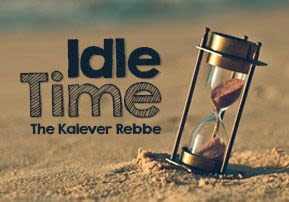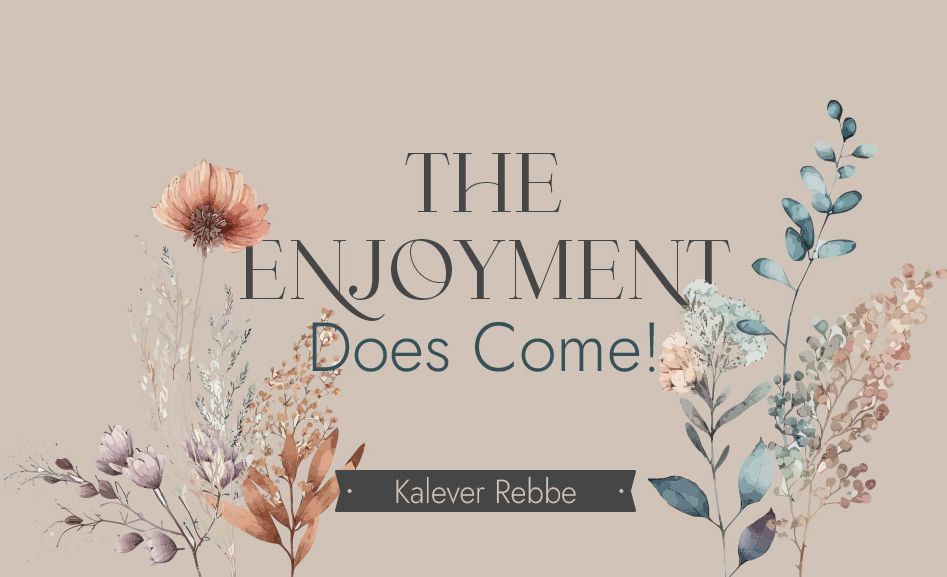
Idle Time
How we occupy our space time plays a critical role in building holy families and communities, committed to Torah and mitzvot.

A Rebbe’s Dance
Reb Moshe Leib from Sasov, z”tl, was a tremendous tzaddik. When he was a young man, his righteousness still unrevealed to the world in its totality, he was diligent with his avodat Hashem, learning Torah every minute of the day until late in the evening. However, late at night, when he was finished learning for the day, he would do something quite remarkable and bewildering:
He would head to the town’s local social hall where young men in the town would meet to hang out, dance, and drink the night away. As the night was dragging on, the men became even more rowdy; behaving carelessly and, eventually their behavior would lead to them sinning.
But, when the Rebbe would go there, things were different.
The Rebbe dressed like the rest of the men, disguising who he was. He would get up and lead the crowd in song after song. His voice was so enjoyable, the men would stay, sing along, and dance until the morning, containing their behavior and avoiding sin. In that room, the Rebbe was able to influence their behavior by keeping them occupied on his terms.
Years later, when the Rebbe was already well known and had hundreds of followers, one of the men who danced with him in the earlier years found his way to the Rebbe’s Tish, his Friday night table. As the Rebbe sang with his Chassidim, this man recognized the Rebbe’s voice and realized that this Rebbe was the same young man who used to come to the hall and sing until the early hours of the morning. Immediately he thought to himself, “Look how much deceit is in this world! One of the men who would dance and sing the night away at our local social halls has this whole room convinced that he is some kind of Tzaddik!”
However, once the Rebbe began to speak, the man was shocked by the sheer magnitude of the Rebbe’s brilliance, the breadth of his Torah knowledge and the holiness that filled the room. This man realized what the Rebbe’s intentions truly were all those years ago: by keeping the men occupied with his songs, he prevented them sinning; he saved them from their own spiritually destructive behavior. When the Rebbe finished speaking, the men walked over to the Rebbe and said to him: “I cannot thank you enough for saving me from sin hundreds of times when I was younger.”
Yosef Imprisoned
A great Torah scholar said that this story of the Sasover Rebbe can help us understand the episode with Yosef HaTzaddik in this week’s parsha.
Egypt is described in the Torah as being a land of promiscuity. It was a culture that was completely defined by its ghastly morals that corrupted every element of their society, particularly in the realm of promiscuity and relationships. And the prison in Egypt was filled with the most morally depraved elements of society. These prisoners had nothing but time on their hands and no productive way to occupy that time. Any idleness leads to sin as Chazal teaches us (Kesuvot 59b) that “idleness leads to licentious”, even worse immoral behavior. These prisoners, in their boredom, behaved even more immorally.
When Yosef HaTzaddik found himself in this place surrounded by these people, who were obligated by the Seven Noahide Laws not to sin with immoral behavior, he decided that he was going to help them; to protect them from their own immoral behavior by distracting them, by occupying their time with food things, like the Sasover Rebbe in our story. He would sing and dance with them, keeping them from regressing any further.
To the onlooker, Yosef appeared to be like any of the other vile prisoners wasting his time drinking, singing, and dancing. However, the warden of the prison saw something different. He saw that Yosef’s behavior was motivated by something deeper, that he was someone holy who was utilizing his skills to help spiritually save these prisoners. He saw Yosef’s success in safeguarding these prisoners from their own spiritually self-destructive behavior as being the result of Hashem’s help.
Through this prism, you can interpret the pasukim in this week’s Parsha (Bereishit 39:22-23) as follows:
“So, the warden of the prison delivered all the prisoners who were in the prison into Joseph’s hand, and whatever they did there, he did it”. – Yosef was placed in charge of all the prisoners and whatever they would do there, so would Yosef.
“The warden of the prison did not inspect anything [that was] in his (Joseph’s) hand” – the warden knew that everything Yosef was doing and would do in the prison would be leshem shemayim, for the sake of heaven, to protect the other prisoners from sinning. As the commentator the Targum Onkelos explains – the warden “didn’t see any sin in Yosef’s hands”, everything was with the help of Hashem and, therefore, he was successful.”
Be Present for Others
This idea was also used by my ancestor, the holy Kalever tzadik, Reb Yitzhak Isaac, zt”l.
When he assumed the position of Rav and Rebbe in Kaalov and the surrounding areas, he was alarmed to see that there was mixed dancing at the weddings of the town people. To remedy the situation, the Rebbe announced that he wanted to attend every wedding from the beginning to the end and, therefore, he asked that only one wedding be scheduled on any given night.
Everyone knew how precious every moment of his time was, yet the Rebbe would be at every wedding from start to finish. The Rebbe was completely immersed in the simcha, dancing throughout the evening. If the Rebbe was there, no one even entertained the idea of having mixed dancing or anything that would violate Torah law. And, they didn’t feel like they were lacking! On the contrary, the attendees were overwhelmed with tremendous ahavat Hashem, love of Hashem, and would connect deeply through the Rebbe’s melodies.
There are countless similar stories of tzadikim throughout the generations giving of themselves, their time, and their energy to ensure that other Jews would not distance themselves from Hashem through their behavior; that they were able to avoid sins simply by the tzadikim occupying their time with mitzvot, with goodness.
It is important to note, that not everyone is able to immerse themselves with sinful company while maintaining their own commitment to Hashem and Torah. Not everyone can guard their own purity with the same certainty as a tzaddik, a righteous person, who can resist being attracted to and following the deeds and mentality of those around them.
However, there is an incredible lesson here for every Jew. Every Jew must invest in themselves and their families. It is critical to ensure that you occupy your free time with “kosher” activities; that you avoid idle time which would leave room for boredom and open the door for sin.
You must reach beyond yourself to help and encourage your family and the people in your life to behave similarly. If you see them wasting their time or being attracted to frivolous pursuits, you must step in. Not with rebuke, but by helping to guide them. You can gently introduce kosher activities, engage with them to ensure that their spare time doesn’t threaten their connection to Hashem. Allow room for boredom and idleness, and you open the door to be led further away from Hashem and his Torah.
The Dreidel
This is at the core of the story of Chanukah. The Greeks had spread throughout Eretz Yisroel introducing their culture, their way of life to the Jews. They established stadiums where Jews were able to attend games and sporting events for free. There was a certain sense of hedonism; a care-free approach to life. Over time, this eroded the Jews‘ commitment to Hashem and His Torah. Eventually, the Greek culture complete devoured their own Jewish identities. And this was the wickedness of the Greeks: they didn’t want to destroy the Jewish body, they didn’t pursue genocide, they wanted to destroy the Jewish identity, to have the Jews neglect their Torah lifestyle.
Chazal teaches us that Greeks decreed that the Jews write on the horns of bulls that would be used in these games, “You don’t have a share in the God of Israel.” Everyone in attendance, all the spectators would see those words and say, “we have no part in Hashem.” This was the purpose of the entire event: convince the Jews to deny their place and commitment to Hashem, God forbid.
But the Hasmoneans fought in this ideological war. They pushed back on the culture. They wanted to direct the Jews towards Hashem and His Mitzvot and to protect them from sin. They wanted to keep them from going to places like stadiums in their free time. So, they invented new, kosher games to occupy the Jews’ time when they weren’t learning or davening. As the seforim (holy books) explain, they invented the dreidel game to keep their children entertained and occupied in a positive and kosher way, when they weren’t able to learn.
As Chanukah approaches, this should be the lesson we learn. Not everyone is able to learn during the whole day. Inevitably, you will have spare time, time when you aren’t learning, davening, or occupying yourself with other mitzvot. What do you do with that time? How you choose to spend that time will define your spiritual well-being eventually.
The lesson of the dreidel is that we must also help others, our family, our sons and daughters, and those we have in our lives, to find kosher ways to occupy their spare time. We must protect them from idleness; the space that can lead to sinful behavior. By doing so, we will be able to achieve what the Hasmoneans did in their time: to build holy Jewish homes and communities that preserve Yiddishkeit and Torah. Amen.











Tell us what you think!
Thank you for your comment!
It will be published after approval by the Editor.